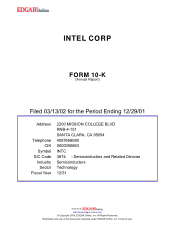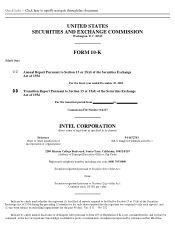Intel 2001 Annual Report Download - page 10
Download and view the complete annual report
Please find page 10 of the 2001 Intel annual report below. You can navigate through the pages in the report by either clicking on the pages listed below, or by using the keyword search tool below to find specific information within the annual report.
offer the Intel® D5205 TDMA Baseband Chipset, a compact two-chip solution, and the Intel® 5206 TDMA Baseband Chip, a compact single-
chip solution both for dual-mode cellular and Personal Communication Services (PCS) band applications. We also offer the Intel®
D5314 PDC
Baseband Chip, a compact single-chip solution for dual rate (full and half rate) baseband processing for personal digital cellular handheld
phones.
New Business Group
The New Business Group operating segment is chartered to develop and grow new businesses around our core capabilities. The group's
current investments include Web hosting services, software and semiconductor products.
In 2001, Intel Online Services, Inc. operated eight data centers offering Web hosting and data center services in the United States, Europe,
India, Japan, China, Korea and Australia.
In 2001, we made the decision to exit the consumer products marketplace and consequently began to phase out our Consumer Product
Division, which provided PC accessories such as the Intel® Pocket PC Camera, the Intel® Personal Audio Player 3000 and the Intel® Play™
Movie Creator. We do not expect the phase-out of this business to have a material impact on Intel's sales or gross margin.
MANUFACTURING, ASSEMBLY AND TEST
The majority of our wafer manufacturing, including microprocessor, flash memory and networking silicon fabrication, is conducted within
the United States at our facilities in New Mexico, Arizona, Oregon, Colorado, California and Massachusetts. A significant portion of our wafer
manufacturing, primarily microprocessor and chipset fabrication, is conducted outside the United States at facilities in Israel and Ireland. As of
year
-end 2001, the Israel and Ireland facilities accounted for approximately 30% of our total wafer fabrication.
As of year-end 2001, a substantial majority of our microprocessors and chipsets were manufactured using our 0.18-micron process
technology in Arizona, New Mexico, Israel, and Ireland. During the year, we ramped our 0.13-micron manufacturing process on 200mm (8-
inch) wafers at three existing facilities in Oregon, California and Massachusetts, as well as a newly constructed facility in Arizona. These
factories produce our most advanced microprocessors, including the latest Pentium 4 processors. The 0.13-micron process technology features
structures smaller than 1/1,000th the thickness of a human hair (0.18 micron is 1/500th the thickness of a human hair).
In December 2001, we began manufacturing 0.13-micron microprocessors in Oregon on 300mm (12-inch) wafers and in February 2002
began shipping products to customers. A second 300mm wafer facility is scheduled to come on line in New Mexico in the second half of 2002.
We expect the larger 300mm wafer size to cut die manufacturing costs by approximately 30% when fully implemented.
During the second quarter of 2001, we completed retrofitting changes, process improvements, and equipment installations and began
manufacturing flash memory using our 0.18-micron process technology at a Colorado facility that we acquired in 2000. In addition to this
Colorado site, we also manufacture flash memory in Oregon, New Mexico and California using our 0.18-micron process technology.
We perform a substantial majority of our components assembly and testing, including assembly and testing for microprocessors, at
facilities in Malaysia, the Philippines and Costa Rica. We also perform components assembly and testing for chipsets and flash memory at a
facility in China. During the third quarter of 2001, we announced an additional investment in the assembly and test facility in China, and we
will use this latest investment to validate, test and assemble the Intel 845 Chipset for the Pentium 4 processor platform. With the expansion, we
have quadrupled the facility's size and enhanced the flash memory chip assembly and test capabilities.
10
We also manufacture microprocessor- and networking-related board-level products and systems at facilities in Malaysia, Washington and
California. During the first half of 2001, we phased out our board manufacturing operations in Puerto Rico for cost competitive reasons.
To augment capacity in the United States as well as internationally, we use subcontractors to perform assembly of certain products,
primarily flash memory, chipsets and networking and communications products, as well as foundry services to manufacture wafers for certain
components, including networking and communications products. We also use subcontractors to manufacture some board-level products and
systems, and we purchase certain communication networking products and PC peripherals from external vendors, primarily in the Asia-Pacific
region.
We have thousands of suppliers providing our various material and service needs. We seek, where possible, to have several sources of
supply for everything, but on limited occasions we may rely on a single or limited number of suppliers. In those cases, we develop and
implement plans and actions to minimize the exposure that would result from a disruption at that supplier. We also typically have multiple
factories at multiple sites around the world producing our leading and highest margin products. However, some other products are only























